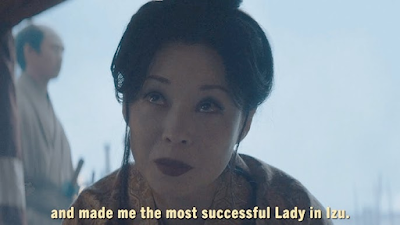(Spoilers for Shogun)
Episode 7 of Shogun sees the wily central Japanese character Toronaga surrounded, defended only by a weakened garrison, at the mercy of his enemies. The Regency Council has summoned him to Osaka, where he will surely be commanded to commit seppuku. It appears he has no choice but to obey.
But the episode is called "A Stick of Time." That refers to the length of time requested by the madam of a high-class "tea house" (brothel), Gin, to talk to Toronaga: the time it takes for a stick of incense to burn down.
What is so important about this interview, that it gets the episode named after it?
Gin has a request. Toronaga is building a new city, Edo, in the Kanto Plain. She has a tea house in the woods. She wants permission to create an entire district of tea houses in Edo, to give her people a world to belong to.
 |
| "My hardships taught me ambition and guile, and made me the most successful Lady in Izu, just as your hardships made you into the cunning man you are today." |
Toronaga is dismissive. He does not expect to live long enough to give or deny her permission.
She says, in the nicest possible way, don't bullshit a bullshitter. How has the wily Toronaga been caught with his pants down. Did his scouts forget to tell him an army was surrounding him?
He says, you think I let this happen intentionally?
She says, oh, hey, what do I know, "I'm just an old whore."
One problem in dramatic writing is dealing with characters who have every reason to conceal what they are thinking. How does the audience know? In this case, how does the audience know to watch episode 8, given that it is presumably about Toronaga and all the characters we love being killed?
You can, of course, give the secretive character someone to unburden himself to. But in Toronaga's case, he is too wily to unburden himself to anybody, at least anyone we know well. It would not be in his interest to tell his butler what his plans are.
Instead we have this madam telling Toronaga, "You're up to something, aren't you?" so Toronaga can say "who, me? Never." Which tells the audience, Toronaga is up to something. They can safely watch episode 8 to see how he gets himself out of this one.
(Act 1: get your hero up a tree. Act 2: he tries to get down from the tree, but only ends up further up the tree. Act 3: he escapes the tree.)
When you have a secretive or dissembling character, consider having someone else say what is on his mind. The audience won't know if they are guessing correctly, which creates much more suspense than if the character reveals himself to someone trusted.
Of course, if you know a bit of Japanese history, you know that this district will be built. It will be called ukiyo-e "the floating world," and artists such as Hiroshige will make a zillion beautiful woodcuts of it. You may also have figured out by episode 7 that Toronaga is based heavily on Tokugawa Ieyasu, who outmaneuvered his enemies to make himself... Shogun. You know that Edo will later be named Tokyo (literally "Eastern Capital"). So his eventual success will not come as a complete surprise. But this is a fictionalization, and for all we know, Toronoga's end is not Tokugawa's end.
So the scriptwriters (and perhaps the novelist -- I haven't read the book in decades) trot out Madame Gin to pull the curtain back just a bit on Toronaga's machinations.
Nicely done!